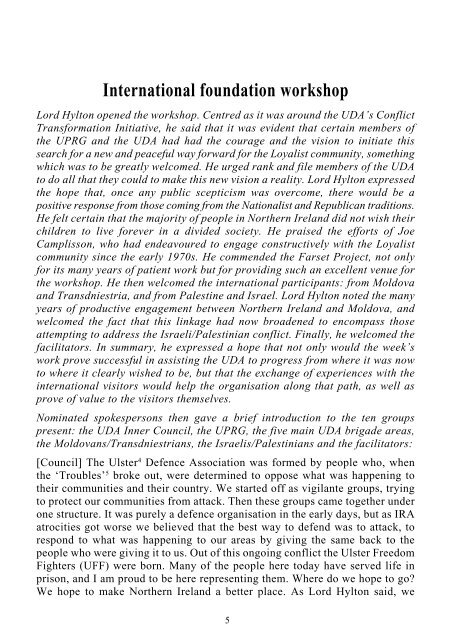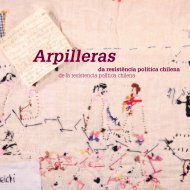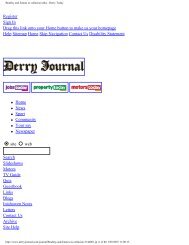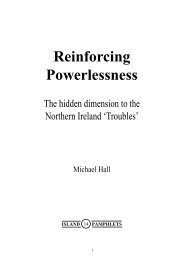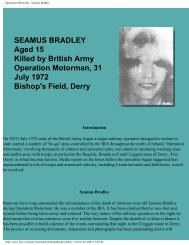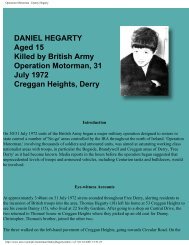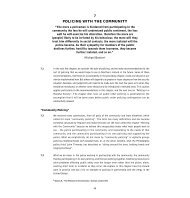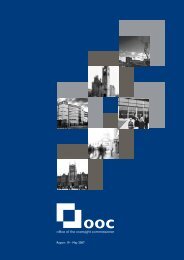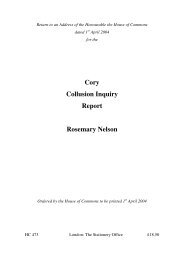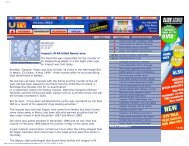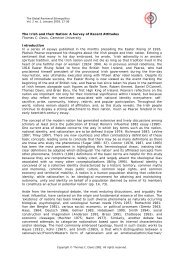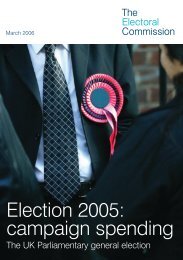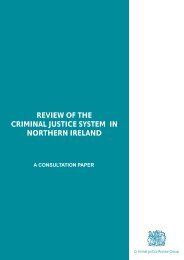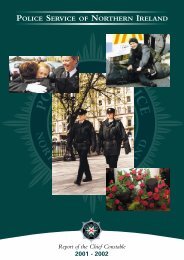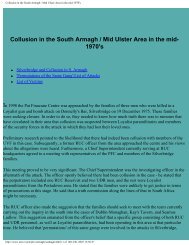Learning from others in conflict - CAIN
Learning from others in conflict - CAIN
Learning from others in conflict - CAIN
- No tags were found...
Create successful ePaper yourself
Turn your PDF publications into a flip-book with our unique Google optimized e-Paper software.
International foundation workshopLord Hylton opened the workshop. Centred as it was around the UDA’s ConflictTransformation Initiative, he said that it was evident that certa<strong>in</strong> members ofthe UPRG and the UDA had had the courage and the vision to <strong>in</strong>itiate thissearch for a new and peaceful way forward for the Loyalist community, someth<strong>in</strong>gwhich was to be greatly welcomed. He urged rank and file members of the UDAto do all that they could to make this new vision a reality. Lord Hylton expressedthe hope that, once any public scepticism was overcome, there would be apositive response <strong>from</strong> those com<strong>in</strong>g <strong>from</strong> the Nationalist and Republican traditions.He felt certa<strong>in</strong> that the majority of people <strong>in</strong> Northern Ireland did not wish theirchildren to live forever <strong>in</strong> a divided society. He praised the efforts of JoeCamplisson, who had endeavoured to engage constructively with the Loyalistcommunity s<strong>in</strong>ce the early 1970s. He commended the Farset Project, not onlyfor its many years of patient work but for provid<strong>in</strong>g such an excellent venue forthe workshop. He then welcomed the <strong>in</strong>ternational participants: <strong>from</strong> Moldovaand Transdniestria, and <strong>from</strong> Palest<strong>in</strong>e and Israel. Lord Hylton noted the manyyears of productive engagement between Northern Ireland and Moldova, andwelcomed the fact that this l<strong>in</strong>kage had now broadened to encompass thoseattempt<strong>in</strong>g to address the Israeli/Palest<strong>in</strong>ian <strong>conflict</strong>. F<strong>in</strong>ally, he welcomed thefacilitators. In summary, he expressed a hope that not only would the week’swork prove successful <strong>in</strong> assist<strong>in</strong>g the UDA to progress <strong>from</strong> where it was nowto where it clearly wished to be, but that the exchange of experiences with the<strong>in</strong>ternational visitors would help the organisation along that path, as well asprove of value to the visitors themselves.Nom<strong>in</strong>ated spokespersons then gave a brief <strong>in</strong>troduction to the ten groupspresent: the UDA Inner Council, the UPRG, the five ma<strong>in</strong> UDA brigade areas,the Moldovans/Transdniestrians, the Israelis/Palest<strong>in</strong>ians and the facilitators:[Council] The Ulster 4 Defence Association was formed by people who, whenthe ‘Troubles’ 5 broke out, were determ<strong>in</strong>ed to oppose what was happen<strong>in</strong>g totheir communities and their country. We started off as vigilante groups, try<strong>in</strong>gto protect our communities <strong>from</strong> attack. Then these groups came together underone structure. It was purely a defence organisation <strong>in</strong> the early days, but as IRAatrocities got worse we believed that the best way to defend was to attack, torespond to what was happen<strong>in</strong>g to our areas by giv<strong>in</strong>g the same back to thepeople who were giv<strong>in</strong>g it to us. Out of this ongo<strong>in</strong>g <strong>conflict</strong> the Ulster FreedomFighters (UFF) were born. Many of the people here today have served life <strong>in</strong>prison, and I am proud to be here represent<strong>in</strong>g them. Where do we hope to go?We hope to make Northern Ireland a better place. As Lord Hylton said, we5


